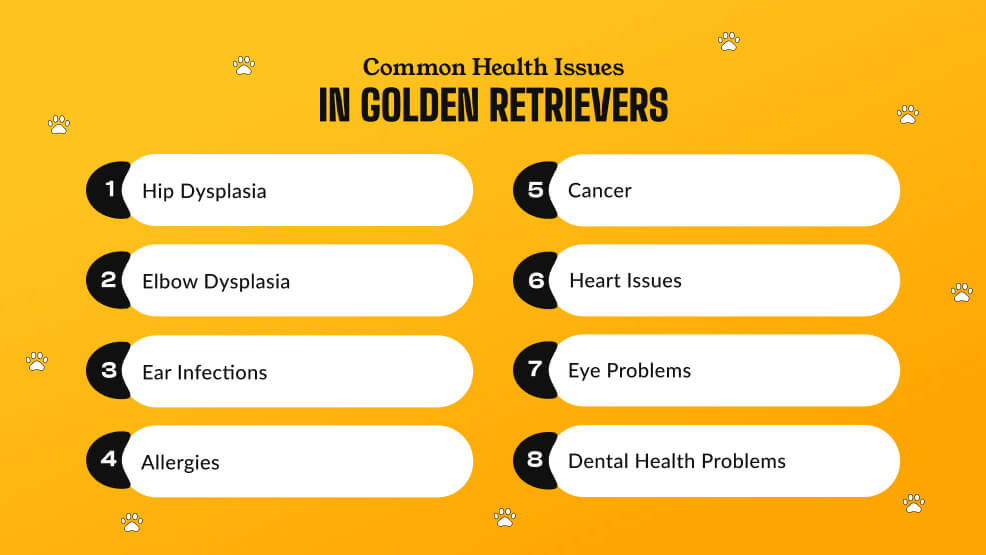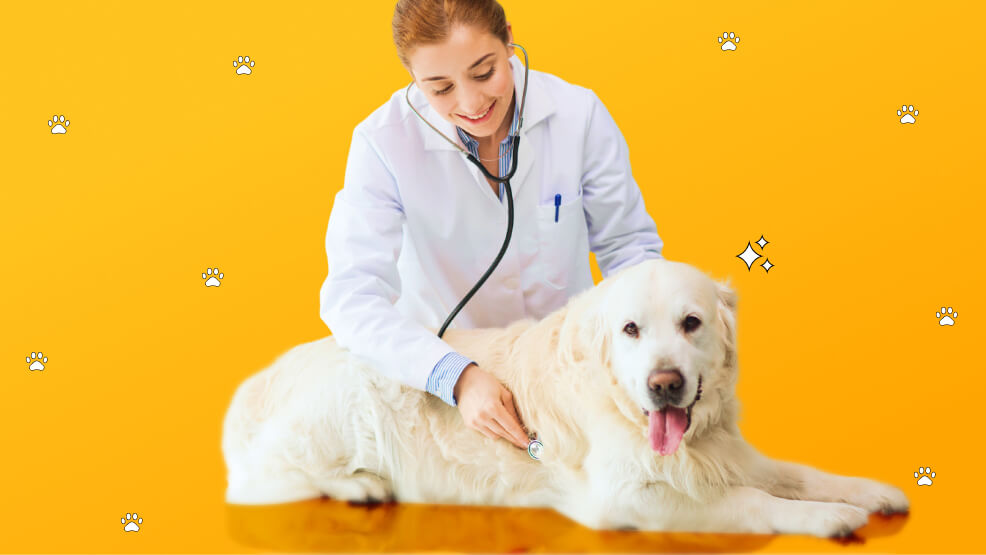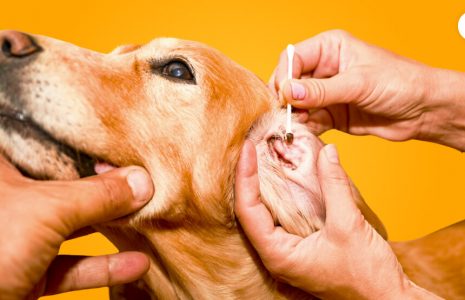Golden Retriever Health Issues: You Should Know as Owners!


Golden Retrievers, with their friendly dispositions and affectionate natures, have captured the hearts of dog lovers worldwide. These loyal companions are renowned for their intelligence, eagerness to please, and unwavering devotion to their human families. However, like any breed, Golden Retrievers are susceptible to certain health concerns that every responsible Goldie parent should know.
By understanding the common health issues that may affect your beloved companion, you can take proactive steps to prevent, detect, and manage any potential problems, ultimately providing them with a happy, healthy, and fulfilling life.
Common Golden Retriever Health Issues

While Golden Retrievers are generally considered a hardy breed, they are prone to various health concerns. Staying informed about these potential issues is the first step in providing your furry friend with the best possible care.
Let’s explore some of the most common health problems that Golden Retrievers may face.
Hip dysplasia
Hip dysplasia is a hereditary condition affecting dogs’ hip joints, including Golden Retrievers. This condition occurs when the ball and socket of the hip joint do not fit properly, leading to instability, pain, and potential arthritis.
The signs of hip dysplasia in Golden Retrievers may include:
- Difficulty rising or reluctance to exercise
- Bunny-hopping gait (using both hind legs together)
- Decreased range of motion in the hind legs
- Lameness or limping
To minimize the risk of hip dysplasia, purchase your Golden Retriever from a reputable breeder who screens for this condition is essential. Additionally, maintaining a healthy weight and providing appropriate exercise can help alleviate the symptoms and slow the progression of the disease.
Elbow dysplasia
Elbow dysplasia is another inherited condition affecting dogs’ elbow joints, including Golden Retrievers. It occurs when the bones that make up the elbow joint do not fit together properly, leading to joint instability, pain, and potential arthritis.
The signs of elbow dysplasia in Golden Retrievers may include:
- Lameness or limping, especially after exercise
- Swelling or thickening around the elbow joint
- Decreased range of motion in the front legs
- Reluctance to bear weight on the affected limb
As with hip dysplasia, purchasing your Golden Retriever from a responsible breeder who screens for elbow dysplasia is crucial. Regular exercise, maintaining a healthy weight, and potential surgical intervention may be necessary to manage this condition effectively.
Ear infections
Golden Retrievers are prone to ear infections due to their floppy ears and the moisture that can accumulate in the ear canal. Bacteria, yeast, or allergies can cause ear infections and if left untreated, can lead to more serious complications.
The signs of ear infections in Golden Retrievers may include:
- Excessive head shaking or scratching at the ears
- Foul odor or discharge from the ears
- Redness or swelling of the ear canal
- Sensitivity or pain around the ear area
To prevent ear infections, keeping your Golden Retriever’s ears clean and dry is essential. Regular ear cleaning and checking for any signs of infection can help catch and treat the problem early. If an infection does occur, your veterinarian may prescribe medicated ear drops or oral antibiotics.
Allergies
Like humans, Golden Retrievers can develop allergies to various environmental factors, such as pollen, dust mites, or certain foods. Allergies can manifest in various ways, including skin irritations, respiratory issues, and digestive problems.
The signs of allergies in Golden Retrievers may include:
- Excessive scratching, licking, or chewing
- Skin rashes, hot spots, or hair loss
- Ear infections or eye discharge
- Sneezing, wheezing, or coughing
- Vomiting or diarrhea
Identifying and eliminating the allergen is the key to managing allergies in Golden Retrievers. Your veterinarian may recommend an elimination diet, allergy testing, or medication to alleviate the symptoms. Maintaining a clean living environment and grooming your Golden Retriever regularly can also help reduce exposure to potential allergens.
Cancer
Unfortunately, Golden Retrievers are prone to certain types of cancer, including lymphoma, hemangiosarcoma (cancer of the blood vessels), and osteosarcoma (bone cancer). Early detection and prompt treatment are crucial for improving the chances of successful management.
The signs of cancer in Golden Retrievers may vary depending on the type and location of the cancer, but some common symptoms include:
- Lumps or masses under the skin or in the mouth
- Persistent coughing or difficulty breathing
- Lethargy or loss of appetite
- Weight loss or swollen lymph nodes
- Lameness or bone pain
Regular veterinary check-ups, including blood work and imaging tests, can help detect cancer early. Treatment options may include surgery, chemotherapy, radiation therapy, or a combination of these approaches, depending on the type and stage of cancer.
Heart Issues
Golden Retrievers are susceptible to various heart conditions, including subvalvular aortic stenosis (SAS) and dilated cardiomyopathy (DCM). These conditions can lead to heart failure and other complications if left undiagnosed and untreated.
The signs of heart conditions in Golden Retrievers may include:
- Exercise intolerance or fatigue
- Coughing or difficulty breathing
- Rapid or irregular heartbeat
- Abdominal distension (due to fluid buildup)
- Fainting or collapse
Regular veterinary check-ups, including heart auscultation (listening to the heart) and diagnostic tests like echocardiograms, can help detect heart conditions early. Treatment may involve medication, dietary changes, or surgical intervention, depending on the severity and type of condition.
Eye Problems
Golden Retrievers are prone to various eye conditions, including cataracts, progressive retinal atrophy (PRA), and cherry eye (prolapsed third eyelid gland). These conditions can lead to vision impairment or even blindness if left untreated.
The signs of eye problems in Golden Retrievers may include:
- Squinting or excessive tearing
- Cloudiness or discoloration of the eye
- Redness or swelling around the eye
- Sensitivity to light
- Difficulty navigating or bumping into objects
Regular eye examinations by a veterinary ophthalmologist can help detect and manage eye problems early. Depending on the specific condition, treatment options may include medication, surgery, or supportive care.
Dental Health Problems
Like humans, Golden Retrievers can suffer from dental issues, including periodontal disease, tooth decay, and tooth loss. If left untreated, poor dental health can lead to pain, infection, and other health problems.
The signs of dental problems in Golden Retrievers may include:
- Bad breath (halitosis)
- Yellowish or brown tartar buildup on teeth
- Bleeding or inflamed gums
- Difficulty chewing or loss of appetite
- Pawing at the mouth or excessive drooling
Regular dental check-ups, professional cleanings, and at-home dental care (brushing, dental treats, and chews) can help maintain your Golden Retriever’s dental health. In severe cases, dental extractions or other procedures may be necessary to address tooth decay or gum disease.
Importance of Proper Nutrition and Exercise for Golden Retrievers

Proper nutrition and exercise are essential for maintaining your Golden Retriever’s overall health and well-being. A balanced diet tailored to your dog’s age, activity level, and specific health concerns can help prevent obesity, support joint health, and promote a strong immune system.
Regarding exercise, Golden Retrievers are an active breed that thrives on regular physical activity. Providing your furry friend with ample opportunities for exercise, such as walks, runs, swimming, or playtime, can help maintain a healthy weight, strengthen muscles and bones, and promote mental stimulation.
Regular Check-ups and Preventative Care for Golden Retrievers

Regular veterinary check-ups are crucial for detecting and preventing health issues in Golden Retrievers. During these visits, your veterinarian will perform a thorough physical examination, recommend appropriate vaccinations, and discuss any concerns or changes you may have noticed in your furry friend.
Preventative care, such as flea and tick control, heartworm prevention, and regular deworming, can also help protect your Golden Retriever from various parasites and diseases. Additionally, staying up-to-date on recommended vaccinations can help safeguard your furry friend against life-threatening illnesses.
Tips for Keeping Your Golden Retriever Happy and Healthy

In addition to addressing specific health concerns, there are several general tips you can follow to help keep your Golden Retriever happy and healthy:
- Provide a loving and nurturing environment
- Engage in regular playtime and mental stimulation
- Groom your Golden Retriever regularly to maintain a healthy coat and skin
- Ensure access to fresh water and a comfortable, clean living space
- Socialize your Golden Retriever from an early age to promote confidence and good behavior
- Stay up-to-date on recommended vaccinations and preventative care
- Monitor your Golden Retriever’s weight and adjust their diet and exercise accordingly
- Be attentive to any changes in behavior or appearance that may indicate a health concern
If you’re a Golden Retriever owner looking to provide the best possible care for your furry friend, consider scheduling a comprehensive wellness exam with your trusted veterinarian. During this appointment, your vet can assess your dog’s overall health, discuss any concerns you may have, and provide personalized recommendations for preventative care, nutrition, and exercise. Don’t wait until a health issue arises – take a proactive approach to ensure your Golden Retriever enjoys a long, happy, and healthy life by your side.









Leave A Comment